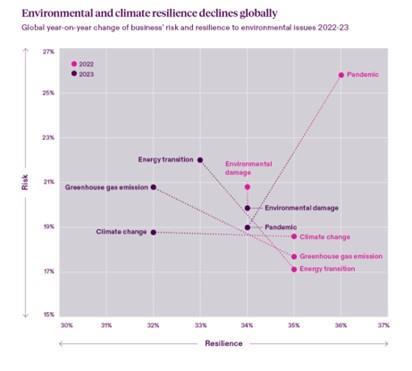Current fears about energy prices and the need to transition may be blinding insureds to the existential threat that climate change poses, London market specialty insurer Beazley warns.
Energy transition risk is the number one environmental risk businesses face, according to the latest edition of Beazley’s Risk & Resilience series.

Among survey respondents ranking top concerns, the threat jumped from 8% in 2021 to 22% last year, according to Beazley’s study “Spotlight On: Environmental Risk”.
Climate change risk, in turn, leapfrogs energy transition to be the biggest risk businesses face next year with more than one in four (28%) predicting it will be the primary concern for 2024.
The survey by London market specialty insurer Beazley polled 2,000 senior business leaders across the UK, US, Canada and Singapore.
A quarter of businesses said they felt unprepared to manage the impact of climate change, with small-and medium-sized enterprises (SMEs) reporting the lowest levels of resilience, Beazley warned.
The data shows that current and short-term concerns about energy transition are deflecting focus away from climate change as the environmental issue of most concern, according to the specialty insurer – but that the reality of the long-term threat posed by climate change is rising to the top of boardroom agendas.
Fears about energy transition were highest among UK firms, where 27% of boardroom leaders identified energy transition as the number one risk.
Among their counterparts in Canada and Singapore 22% and 21%, respectively, cited it as the primary area of concern.
“The US, with its greater onshore energy resources, is perhaps less concerned with transition risk, instead greenhouse gas emissions, and the costs associated with reporting on them, are the greatest environmental concern for a quarter of US business leaders,” Beazley observed.
Across the globe, business leaders’ thinking becomes more aligned as we look forward, Beazley emphasised, with just 9% predicting that energy transition will be the top risk in 12 months’ time. Instead, climate change leaps up as the biggest environmental risk business leaders believe they will face.
Worryingly, a lack of business preparedness for climate-related risks has led to a quarter of global business feeling unprepared to face the impacts of climate change, Beazley said.
Small and medium businesses are feeling most exposed, with 28% of firms that generate under £100m revenue noting they are unprepared, versus 21% of businesses with revenue over £100m, the London market firm added.
Just as environmental risks are climbing up the agenda so business confidence in its resilience is dropping fast as all areas of environmental risk suffer a fall in resilience levels.
The impact on energy resources caused by the Russia/Ukraine war over the last 12 months has significantly impacted on business leaders’ thinking and perception of resilience, according to Beazley.
“The energy transition, undoubtedly linked to the Russian invasion of Ukraine, has become the key area of concern globally,” said Bob Quane, chief underwriting officer, Beazley.
“For business leaders facing this immediate crisis, it is unsurprising that the focus is on mitigating the short-term impacts rather than focusing on the steps they need to take to adapt for the long-term.
“However, the current low levels of resilience that many business leaders feel in the face of climate change, coupled with the reality of the effects we have seen over the past 12 months, means a change of mindset is urgently needed,” Quane added.











No comments yet